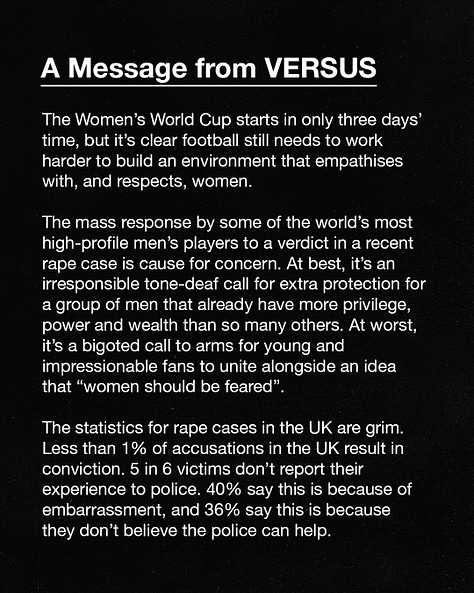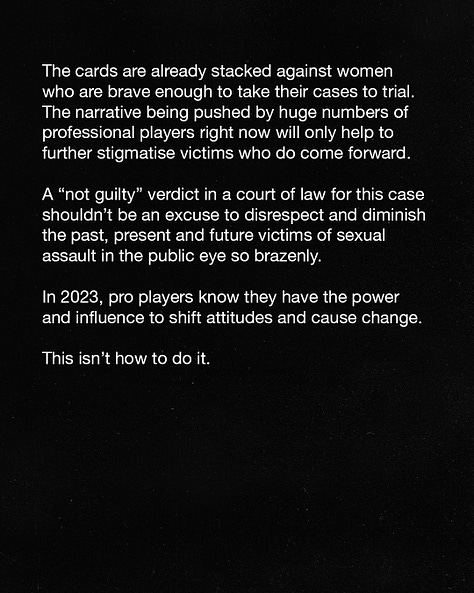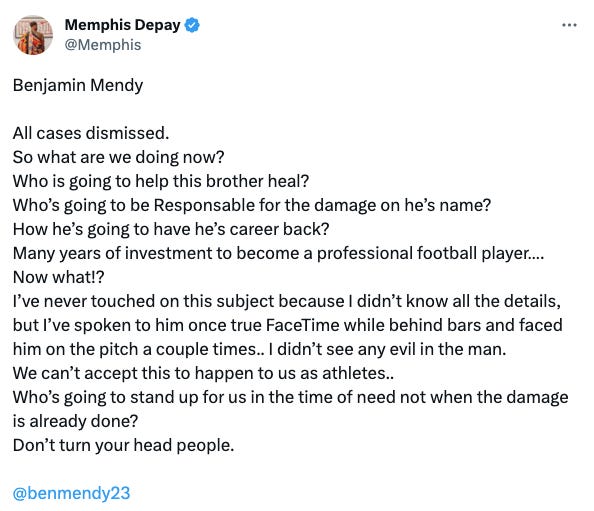Trigger warning: this article contains reference to legal proceedings concerning sexual assault.
Football is no stranger to icons. The game forges them like no other, in countless forms. There are the black-and-white myths of Di Stefano and Yashin, the graceful nobility of Pelé, the flawed mavericks of Best and Maradona, or the savants of Cruyff and Zidane.
The influence of these men on football is such that their names have become shorthand for eras, for moments, for ideas, and for contrasting ideals. Yet, despite their differing legacies, these players share one thing: determination.
Like all legends, they have origin stories; tales of kicking tennis balls against brick walls, of being dragged from pitches as meals cool on dining tables, of fitful sleeps on never-ending bus rides. There may be embellishment, but football regularly wrenches its icons from the grips of poverty and adversity; or rather, they wrench themselves. To do this, to “make it”, requires obsession, and so it is the obsessive who succeed.
This has never been truer than today. The modern game is populated by Übermensch, whose existence is characterised by ice baths, missed birthdays, and chicken and pasta diets. It is a competitive, vicious and, above all, masculine industry. To thrive within it requires feverous and single-minded devotion.
Look at the now-faded icons Lionel Messi and Cristiano Ronaldo, or their heirs, Erling Haaland and Kylian Mbappe. These players are mechanical in their brilliance, favouring efficiency over flamboyance, routine over risk. They represent the incomprehensible drive, sacrifice, and self-interest required to become a professional footballer - particularly if, like me, you were born with the sporting ability of a lobotomised spider.
One of these professional footballers, Benjamin Mendy, was recently found not guilty of the rape or attempted rape of six women, following a retrial of two unresolved allegations. Another, Memphis Depay, tweeted his support of Mendy, and questioned the recourse open to professional athletes. And dozens of others liked or voiced their agreement with Depay’s post.
Why this reaction is so horrifying has been expressed far more eloquently than I ever could by Sarah Shephard. VERSUS also summarised the social stigma facing sexual assault victims, and women. But, to put it simply: this is an example of men using their significant influence to further a culture of silence.



I am wary, at this point, of stereotyping footballers as unintelligent. This is not the case. It is because I believe professional athletes are creative and lucid thinkers which makes reading the backing for Depay’s post so demoralising.
These footballers’ harmful attitudes are more precise, more conscious, and are a product of the very mentality that has allowed the men who hold them to succeed: self-centred determination. They are unable to see beyond themselves, and their own importance.
Footballers’ environment certainly doesn’t challenge this blinkered mindset.
These players exist in a pandering world, gushed over by agents and pampered by the clubs they represent. For most, their family members’ lives are geared around their careers, encouraging their son or husband’s individualism.
It strips them of perspective, and imbalances their worldview.
And fans adore this rise-and-grind mentality. How could they not, when football is portrayed as a matter of life and death? They want to see these men sacrifice themselves for the eternal glory of their clubs. I’ll admit, a part of me does too.
I believe it is natural – within reason - to idolise, to wonder at things you are incapable of doing, and at the people who do them. Footballers, especially good ones, hold our emotions like few others. In one moment they can exhilarate, excite, or enrage. They are a conduit for our aspirations, they are the best part of our week.
Many fans are happy to excuse the deeply troubling corners of these “great men”. So what if Messi is a millionaire tax-dodger? Who cares if Ronaldo is an alleged rapist? Does it matter that Mason Greenwood is a women-beating monster? We’re playing Burnley away this weekend and really need a result.
But the product of this ego-coddling, and of this by-standing, is those of us who hold room in our hearts for footballing heroes, are left with un-empathetic, overpowered man-children as choices.
What then, as thinking fans, are we meant to feel? What is our duty? There is, thankfully, a minuscule twinkle in the gloom: Héctor Bellerín.
I, along with most Arsenal fans, first laid eyes on this scampering Spaniard in 2014.The then-19-year-old moved like a Scalextric, zipping along the right touchline under the proud gaze of Arsène Wenger. When he spoke there was an Islington twang to his Catalan tones, and his words conveyed pride in playing for the club.
He seemed to care. Add to this his penchant for menswear, and his model looks, and it’s safe to say he was my favourite player. He even spent a good few months as my phone background.
Yet, in purely footballing terms, Bellerín’s career carries hints of disappointment. Regular injuries curtailed his early promise, and, after three contract terminations in a year, he recently re-signed for Real Betis.
Playing in Seville is nothing to scoff at, but to the Ronaldo’s of this world, this career would be unthinkable. Where are the fan boy armies debating vague concepts? Where are the trophy cabinet graphics? Where are the excessive pre-pre-season training videos?
And yet Bellerín appears content. He continues to play at an absurdly high level. He designs and models clothes. And, on VERSUS’s post, he simply commented: ‘Word’.
Bellerín is a rarity in the modern game, an actively socially conscious footballer. He owns shares in Forrest Green Rovers, the world’s greenest football club. He recently advocated higher taxes for footballers. And he was the only male elite pro who stuck his head above the parapet, even in a minor way.
It seems Bellerín’s only major footballing honour will be his run as my screensaver. But perhaps it is time we stopped deifying those with the most tin cups in their cupboard, and focused on those whose off-field achievements are more meaningful? Maybe it’s time to fawn over those who keep their promises to LGBTQI+ groups? Should we not praise players who protect those weaker than them?
Can’t we idolise Raheem Sterling, or Marcus Rashford?
It seems an obvious point, but I think we should.
So keep your Haalands, and keep your Ronaldos. Enjoy their on-field heroics, and ignore their off-field failings. Keep them because, once again, my favourite footballer is an injury-prone right-back with a North London accent, and a kind heart. After all, that’s what should matter.
If you have experienced sexual assault, or know someone who has, you can contact Rape Crisis UK & Wales for free using 0808 500 2222, or visit their website here.
If in South Africa, you can contact Rape Crisis using 021 447 9762, or visit their website here.






